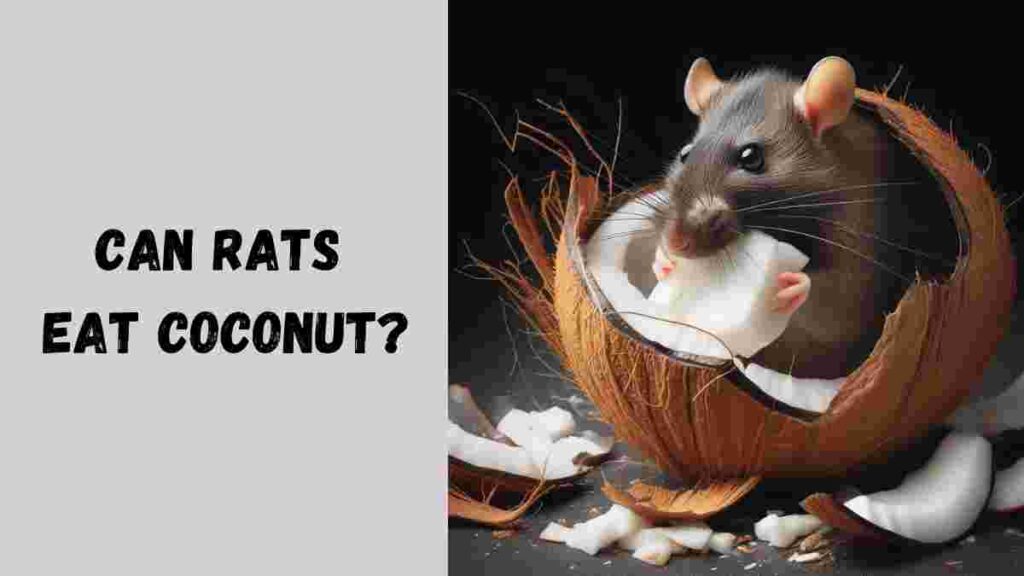Can rats eat coconut: In the wide world of dietary options for pet rats, coconut may seem like a paradox. After all, these tiny bounties of fluff and whiskers are often associated with more mundane munchies – vegetables, fruits, grains, and specially-designed pelleted diets.
However, as a conscientious rat owner or enthusiast, understanding the nuance of their dietary needs and potential treats like coconut is pivotal. In this expansive post, we’ll shed light on whether coconut is a deliciously permissible addition to a rat’s diet or yet another nutty proposition.
Best Nutritional Option For Your Rodent Friend
Best Toys For Your Rodent Buddy

Table of Contents
Understanding Rats’ Diet – Can rats eat coconut?
In nature, rats are consummate foragers, employing a diverse diet to survive. They’re omnivorous, meaning they eat both plant and animal matter, but they’re also selective. The balance of their food choices is critical to their well-being. Pet rats, on the other hand, don’t have the benefit of the broad buffet their wild counterparts do. They rely on their human caregivers to provide a nutritionally complete diet that mirrors, to some extent, the variety and balance of their natural choices but within a controlled domestic setting.
The Essentials of Rat Nutrition
A rat’s diet consists primarily of:
- High-Quality Rat Pellets: Formulated with essential nutrients, these should be the staple.
- Fresh Water: Always available and frequently changed to prevent bacterial growth.
- Vegetables and Greens: A rich source of vitamins and minerals.
- Fruits: A sweet and fruity complement to their diet, albeit in moderation due to the high sugar content.
- Proteins: Meats, cooked eggs, and dairy in controlled portions.
- Grains: Oats, barley, rice, and pastas make for complimentary carbohydrate sources.
- Treats: Occasional tasty morsels to provide mental stimulation and variety.
Wild vs. Pet Rats’ Diets
Wild rats have a high element of protein in their natural diet due to scavenging and the consumption of small animals. Pet rats, while still needing ample protein, may not require as much as their wild relatives. Their domestic lives are generally less strenuous and, as such, they may benefit from a slightly different ratio of nutrients. Nonetheless, the need for variety remains a common denominator between the two.

The Nutritional Aroma of Coconut
Coconut, with its exotic allure and versatile flavor, packs a unique nutritional punch. It’s highly regarded in human diets for its content of healthy fatty acids, dietary fiber, manganese, and the promise of myriad health benefits. But how does it stack up for our wiry-tailed compatriots?
Coconut’s Nutritional Profile
Coconut is:
- High in Fiber: Which can support digestive health.
- A Rich Source of Manganese: An essential mineral for metabolism.
- Energy-Dense: Thanks to its fat content, which could be beneficial for active rats.
- Low in Protein: Potentially less ideal for rats who might need more protein.
Compared to Common Rat Foods
Rat pellets are designed to be nutritionally complete, and compared to these, coconut offers more of certain nutrients. However, it’s also nutrient-dense in terms of fats, which may not be a primary requirement for most rats.
The Rat’s Verdict: Can rats eat coconut?
Now we’re at the crux of the matter – can rats eat coconut? The answer is, technically, yes. Coconut can be a part of a varied diet for rats, just like it can for many other animals. However, as a responsible rat owner, there are considerations to be made.
The Safe Consumption of Coconut for Rats
Feeding coconut to rats should be done with caution and in moderation. Like all new foods, it’s best to introduce coconut gradually and observe for any adverse reactions.
Weighing the Benefits and Risks
Understanding the potential health benefits and possible drawbacks is crucial. While coconut offers some advantages, such as supporting digestive health and being a source of essential fatty acids, the high-fat content may not be suitable for all rats.
Health Benefits of Coconut For Rats
Rats, like humans, can benefit from certain aspects of coconut consumption.
Improving Digestive Health
Coconut is known for its fiber content, which can aid in digestion. Inclusions of controlled coconut portions may help with constipation issues.
Healthy Fats for Active Rats
For rats who engage in a high level of physical activity, coconut can serve as a good energy source, supporting their active lifestyle.
Potential Risks of Coconut Consumption
Coconut is not without its potential downsides for rats.
Addressing Concerns Over High Fat Content
For rats with weight or health conditions, the high-fat nature of coconut might pose risks. A balanced approach to treats like coconut is important.
Allergies and Sensitivities
Rats, just like humans, can have sensitivities to new foods. Coconut may cause allergic reactions, although this is rare.

Preparing and Serving Coconut Safely to Rats
Ensuring that the coconut is well-prepared and presented is a critical component of responsible feeding.
Safe Handling and Cleaning Processes
Always clean and handle the coconut properly to prevent bacterial contamination.
Preparing Coconut for a Rat’s Palate
Shredded, grated, or small pieces are best to prevent choking hazards and facilitate consumption.
Serving Sizes and Frequencies
Smaller pieces of coconut, as a rare treat, offer the best ratio of enjoyment to potential risks.
Introducing Coconut to a Rat’s Diet
Gradual introduction, much like with any new food, allows the rat’s system to acclimate and the owner to observe any changes in behavior or health.
Various Forms of Coconut for Rats – Can rats eat coconut?
Coconut comes in different forms that cater to the discerning rat.
Fresh Coconut
Rarely fed due to its perishable nature and unavailability, but a valid treat if accessible.
Dried Coconut and Shredded Coconut
Easily stored and served, these are common options for treating rats to coconut delicacies.
Coconut Milk or Cream
Controlled amounts of these could add variety to a rat’s diet, but watch out for added sugars and other unnecessary ingredients.
Integrating Coconut Into a Rat’s Diet – Can rats eat coconut?
For the coconut-curious rat owner, there are ways to incorporate coconut without upsetting the balance.
Balancing Treats with Staples
Any treat, including coconut, should not exceed 10% of the rat’s total diet.
Coconut as a Nutritional Complement
If fed occasionally and in suitable amounts, coconut can offer a unique nutritional element to the rat’s diet.
Observing Rat Reactions to Coconut Consumption
Rats, being creatures of habit, may exhibit clear signs of enjoyment or dissatisfaction with new foods.
Positive Indications That Rats Enjoy Coconut
Increased activity and eagerness are positive signs that coconut has hit the flavor spot.
Negative Indications
Refusal to eat or signs of discomfort may signal that coconut is not agreeing with the rat’s system.
Frequently Asked Questions (FAQ) – Can rats eat coconut?
Can we use Coconut Oil, Shells, and Flakes as rat foods?
While some forms are more common than others, each requires a nuanced understanding before serving to rats.
Is moderate amount of coconut necessary for rats?
How coconut fits into a rat’s diet and the best way to ensure it remains safe for consumption.
Will rats have allergies if they consume coconuts?
For rats with specific health or dietary restrictions, including coconut requires extra attention.
Should Rats be Plunging into a Coconut?
The final consensus on feeding coconut to rats is two-fold. On one hand, it offers distinctive nutritional elements and can be enjoyed as a rare treat. On the other, its high-fat nature and potential for allergies or sensitivities necessitate a judicious approach to feeding.
Responsible Rat Feeding Practices
Variety is the spice of a rat’s life, but moderation is just as critical. Feeding coconut to rats responsibly means understanding the role it can play in a balanced diet without causing harm.
The Joy of Treats in a Rat’s Life
Treats, including coconut, can offer sensory and nutritional variety if managed thoughtfully. A happy rat is one that enjoys a treat without it becoming the core of their dietary pyramids.
Final Thoughts – Can rats eat coconut?
The intersection of humans and their pets often reveals intriguing questions about shared foods and dietary crossovers. The coconut is a prime example of a globally popular food item that, with consideration and care, can find its way into the diets of our furry friends.
By approaching the topic with respect for each animal’s uniqueness, we not only steward our pets’ health but also enrich the bonds we share with them.

Pingback: Can rats have cinnamon? Unraveling the Super Cinnamon Mystery for Pet Owners [3 Key Findings] - Pawfect Pet Tips
Pingback: Can Rats Have Yogurt? A Comprehensive Guide for Pet Owners [3 Powerful Findings] - Pawfect Pet Tips